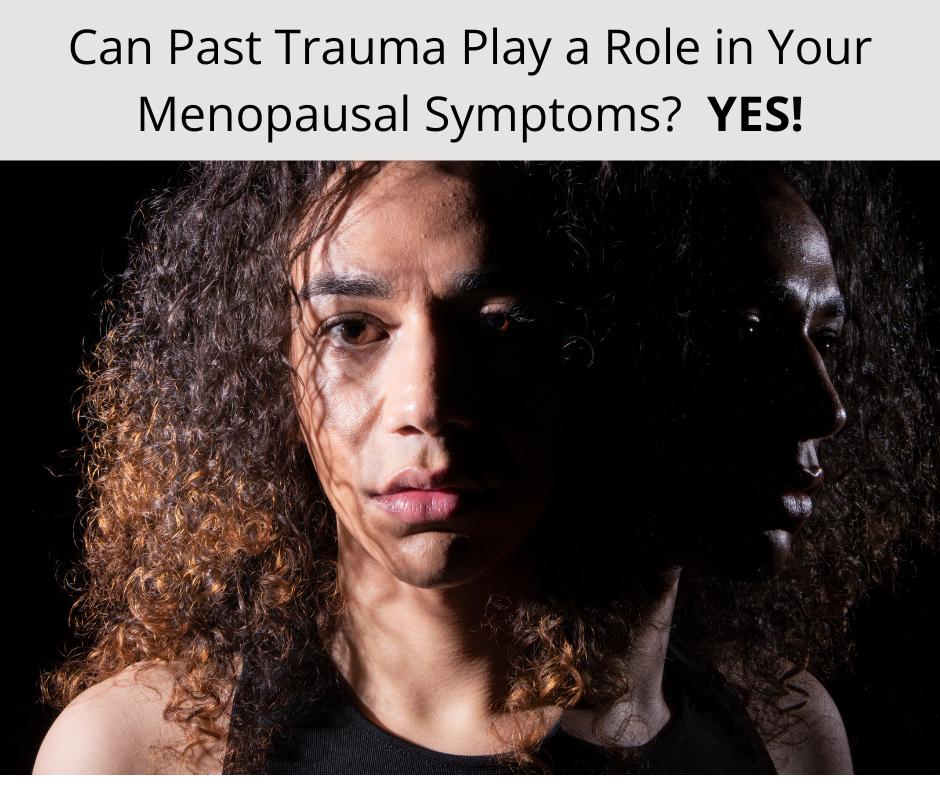The Impact of Trauma on Perimenopause and Menopause: Navigating a Complex Intersection

The Impact of Trauma on Perimenopause and Menopause: Navigating a Complex Intersection
Introduction: Menopause is a natural and inevitable phase in a woman's life, marked by hormonal shifts and changes in various aspects of health. However, what is often overlooked is the intersection of menopause with past traumatic experiences, which can significantly influence the physical and emotional journey through perimenopause and menopause.
According to a study in JAMA¹:
“Those who have experienced trauma in their lives often have a particularly difficult time in the perimenopause > menopause transition. Many report a resurgence of emotional symptoms and worse physical symptoms than those who haven't experienced trauma”.¹
Even intergenerational trauma can have a profound effect on menopause with early menopause and increased symptomatology resulting. Resetting the nervous system with specialized techniques is needed and has been found more effective than traditional therapy.
Understanding Trauma and Its Long-Term Effects
Defining Trauma:
Trauma encompasses a range of experiences, from significant life events to ongoing stressors. Major trauma, such as physical and sexual abuse or any event perceived as violent or threatening violence. It can also include microtraumas and stressors that can build up in our system and cause the same symptoms. This may include verbal threats and abuse, being yelled at by an adult, not having available food and other life’s necessities when you are young, severe financial insecurity, loss of a loved one and many other non-violent stressors.
The Long-Term Impact:
Trauma can have enduring effects on both mental and physical health. The body's stress response system, including the release of cortisol, may be dysregulated, affecting various physiological processes.
The Complex Intersection of Trauma and Hormonal Changes
Perimenopause: A Time of Transition
Perimenopause, the transitional phase leading to menopause, is characterized by hormonal fluctuations. For women with a history of trauma, this phase can trigger or exacerbate emotional and psychological challenges. It can also initiate perimenopause and menopause earlier than most women.
Menopause: Hormonal Shifts and Emotional Well-being
As menopause sets in and estrogen levels decline, women may experience mood swings, anxiety, and depression. Trauma survivors might find their emotional well-being further impacted, as hormonal changes interact with pre-existing psychological scars.
Specific Ways Trauma Can Affect Perimenopause and Menopause
Hormonal Dysregulation:
Trauma survivors may experience disruptions in the endocrine system, leading to imbalances in hormones such as cortisol, estrogen, insulin and progesterone.
Exacerbation of Emotional Symptoms:
Symptoms like anxiety, depression, and mood swings may be heightened during perimenopause and menopause for those with a trauma history.
Impact on Physical Health:
Trauma can contribute to conditions like chronic pain, autoimmune disorders, and gastrointestinal issues, which can be exacerbated during menopause.
Holistic Approaches appear to be among the most effective
Working with a trained holistic practitioner/coach who uses a combination of approaches is most important because what works for one woman, may not work for another. Such things as mindfulness, herbal remedies, meditation, EFT and other specialized neurophysiological healing techniques may be used.
All these techniques will help you become more aware of your body and mind and the active role you can play in relieving these symptoms naturally and completely. The results on anxiety and other symptoms of trauma can be highly significant and result in permanent improvement in these conditions.
Hormone Replacement Therapy (HRT):
In some cases, HRT may be considered to alleviate severe symptoms, but its appropriateness should be discussed with a healthcare professional. We generally find other ways to balance hormones that work very well such as nutritional and herbal therapies. In an acute situation, however, hormones may be considered necessary.
Conclusion
Navigating perimenopause and menopause while carrying the weight of past trauma can be an intricate journey. Understanding the ways trauma can affect hormonal changes and emotional well-being is crucial for developing tailored coping strategies. By seeking support, both emotionally and professionally, women can empower themselves to embrace this transformative phase with resilience and self-compassion. Remember, healing is a process, and each woman's journey is unique.
Will our unique Holistic Menopause+ program work for you? Let’s talk: https://calendly.com/askmeanythingaging/discovery
- Gibson CJ, Huang AJ, McCaw B, Subak LL, Thom DH, Van Den Eeden SK. Associations of Intimate Partner Violence, Sexual Assault, and Posttraumatic Stress Disorder With Menopause Symptoms Among Midlife and Older Women. JAMA Intern Med. 2019;179(1):80–87. doi:10.1001/jamainternmed.2018.5233